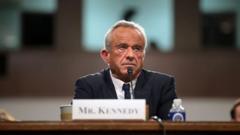Kennedy's recent confirmation hearing to become the U.S. health secretary providing insights into his controversial past and future plans. The session, filled with interruptions and applause, brought to light key issues surrounding public health, including Kennedy's historical vaccine skepticism and evolving views on abortion, as senators questioned his fitness for the role.
Throughout the hearing, Kennedy was pressed on his previous statements regarding vaccines. As the head of Children's Health Defense for eight years, he was linked to claims undermining the safety and efficacy of vaccines, including the long-debunked theory that they might cause autism. In his defense, Kennedy insisted that he is not anti-vaccine but rather supports rigorous studies and tests to ensure safety. He challenged the label of being a conspiracy theorist by stating, "That's a pejorative that's applied to me to keep me from asking difficult questions about powerful interests." Yet, senators highlighted his controversial comments made on a recent podcast, wherein he suggested that no vaccine could be deemed entirely safe and effective.
Kennedy’s stance on processed food also drew attention. In his opening remarks, he expressed discontent with the U.S. food industry, attributing the obesity epidemic to chemical additives. "We will reverse the chronic disease epidemic and put the nation back on the road to health," he assured the Senate. Despite his criticisms, he clarified that he did not intend to restrict access to processed food, humorously acknowledging Trump’s fondness for McDonald's.
Kennedy faced pointed inquiries regarding his shifting views on abortion, previously expressing support for abortion rights. Republican Senator Lankford questioned him about reinstating protections for doctors against performing abortions for religious reasons. Kennedy acknowledged that he believes every abortion is a tragedy but stated that he would defer to Trump’s policies, leading to accusations from Democrats of compromising his principles for the nomination.
A notable moment occurred when Senator Bernie Sanders challenged Kennedy on universal healthcare, prompting questions about equitable access to healthcare for individuals with lifestyle-related ailments. Kennedy’s response was non-committal, complicating his position further.
The hearing’s atmosphere showcased a partisan divide, with Democrats scrutinizing Kennedy’s past beliefs and Republicans rallying around his proposals aimed at promoting health. Notably, Republican Senator Ron Johnson called Kennedy "the answer to his prayers," while Senator Wyden accused him of being untrustworthy.
Kennedy’s confirmation process continues with a subsequent hearing forecasted, as he aims for approval from both Senate committees before reaching the entire Senate for a vote. The unfolding narrative surrounding his nomination could significantly impact the prioritized public health policies in the coming term.



















